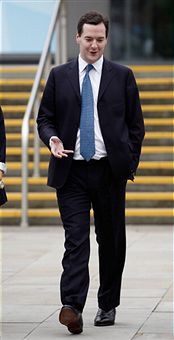 George Osborne is pursuing the Tesco strategy: every little helps. In his conference
speech today, he will announce that he has found £805 million to freeze council tax next year, which will save taxpayers £72. Not a
lot, you might think – and that’s
Labour’s view – but the chancellor is adamant that he won’t “stand on the sidelines” while living standards contract. Substantial tax cuts have been ruled out by Osborne, but he is expected to make further announcements on benefits. Last week,
it was rumoured that he would reverse changes to child benefit for a parent who earned around
£42,000 per year. (There are also rumours that the income tax threshold might be increased at some stage, fulled by IDS’ comments at a fringe event last night.) If those rumours prove
true, then there is little doubt that Osborne is pitching his camp in Middle England, among those C1 and C2 voters who have remained tepid about the Cameroons thus far.
George Osborne is pursuing the Tesco strategy: every little helps. In his conference
speech today, he will announce that he has found £805 million to freeze council tax next year, which will save taxpayers £72. Not a
lot, you might think – and that’s
Labour’s view – but the chancellor is adamant that he won’t “stand on the sidelines” while living standards contract. Substantial tax cuts have been ruled out by Osborne, but he is expected to make further announcements on benefits. Last week,
it was rumoured that he would reverse changes to child benefit for a parent who earned around
£42,000 per year. (There are also rumours that the income tax threshold might be increased at some stage, fulled by IDS’ comments at a fringe event last night.) If those rumours prove
true, then there is little doubt that Osborne is pitching his camp in Middle England, among those C1 and C2 voters who have remained tepid about the Cameroons thus far.
Osborne is an inveterate schemer and he has not limited himself to one tactical ploy. His proposed council tax cut will not be automatic, but councils that choose to implement the cut will receive extra funds to spend, providing they have restrained spending increases to less than 2.5 per cent. Similar strategic logic inspired Eric Pickles’ weekly bin collection policy: reward councils that take the decision, blame those that do not. The coalition has tried to make councils responsible for their spending decisions in era of constrained public finance. Put crudely, Pickles gave councils a choice: save public libraries or hire diversity officers. Voters would, it was thought, blame local government rather than central government for choices that cut “frontline services”. It’s not yet clear if the ploy has worked and perhaps Osborne has raised the stakes with his latest proposal: daring councils not to adopt the freeze.
Finally, the chancellor will concentrate on defending his deficit reduction plan, drawing a contrast with the vacillating Eurozone. He will also bolster his growth agenda. He told the Today programme that he will reinvest “underspend” in infrastructure projects, such mobile phone coverage and scientific research. Osborne’s immediate challenge is to convince sceptics in the hall and the country that these piecemeal initiatives will be sufficient to deliver Britain from disaster.






Comments